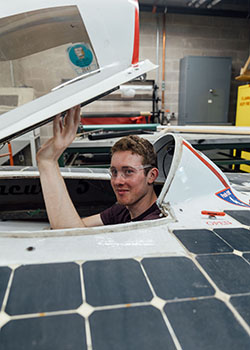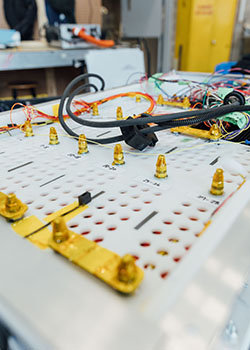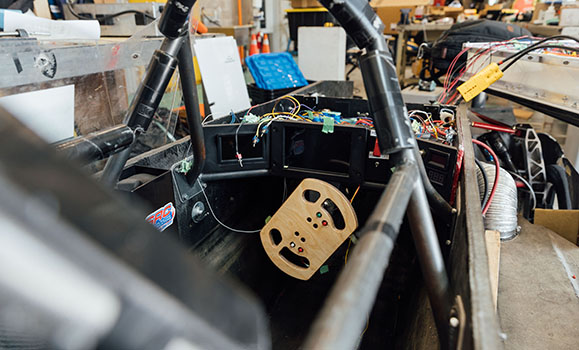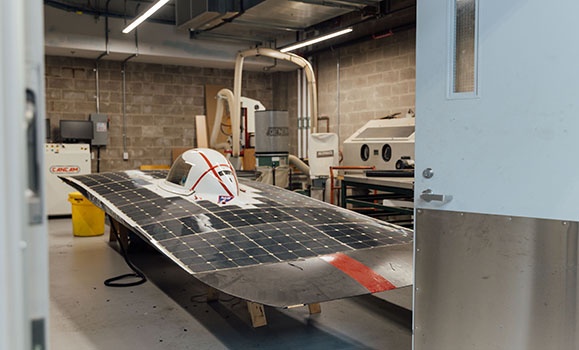Tucked inside a busy lab at »ĆÉ«Ö±˛Ą's Emera IDEA building and behind stacks of plastic containers, mounds of wire and rolls of carbon fibre sits a model that could offer a glimpse of the future of transportation.
Students pour over a sleek panel of arrays that forms the top of a vehicle headed to a unique race in Kansas that will see more than a dozen solar cars from across Canada and the U.S. compete against each other over three days.
The structure was built by more than a dozen dedicated Dal Engineering students who have worked day and night for the last month to put the finishing touches on their solar car — the first of its kind in Atlantic Canada.
They will showcase the debut car at the Formula Sun Grand Prix in Topeka, where they will undergo three days of scrutineering starting tomorrow before their solar-powered car hits the track for three days of races.
"I'm really excited to do this!" says Gina Park, a fifth-year Electrical Engineering student who founded the team in 2021. "Everyone is a little tired, but it's going to be fun. We've spent so much time in the shop working on this."

Gina Park is one the Dal solar car team's four drivers.
The team of mechanical, industrial, electrical, environmental and chemical engineering students did all of the work to wire the solar cells and put together the battery pack assembly that sits in the front section of the chassis, underneath the solar panels.
When it is fully assembled, the car weighs roughly 300 kilograms and is five metres by two metres, with the driver's plastic viewing bubble popping up in the centre. The eight-person race crew is hoping to get it up to about 70 kilometres an hour, but Park says the competition is more about how many laps they can complete rather than how fast they can race down the course. They are hoping it will last eight hours on a single charge.
Park is one of the team's four drivers, but will have to add a little weight to the cabin to meet the race's 80-kilogram requirement.
"I am smaller than that and I needed to have extra weight, so I ordered 8,000 nickels from the bank!" she says with a laugh, pointing to where the boxes of coins will sit in the compartment when she gets behind the homemade wooden steering wheel.
Seeing the possibilities
Each of the drivers will have to pass dynamics tests that require them to do such things as stop the car on wet pavement at high speed and do a slalom course.
 Noah Bugden, the team's motor lead and a third-year Electrical Engineering student, explains that the electricity converted from the sun will flow into a high-voltage box and into their battery box, move through the contactors to the motor controller and then to the motor itself, ultimately making the car move.
Noah Bugden, the team's motor lead and a third-year Electrical Engineering student, explains that the electricity converted from the sun will flow into a high-voltage box and into their battery box, move through the contactors to the motor controller and then to the motor itself, ultimately making the car move.
Shown right: Noah Bugden settles in.
Both say they were drawn to the extracurricular project because of the global need to create more sustainable forms of transportation. Park, who started the team two years ago, was looking for a design project and wanted to do something had not been done before and made environmental considerations a priority.
In an interview for a co-op program at the time, she met an alumnus who had been part of a solar car team.
"It just clicked and I couldn't stop reading about it — I was kind of hooked," she says. "Part of our mission is to get people who are not engineers to look at us drive and think, 'That could work.'"
"There are already start-ups doing this and Atlantic Canada really has the potential. There is a lot of interest, but not a lot of execution right now so we're wanting the public to get excited about it and help them realize it is possible."
Private-sector support
 Over the last year, the team has raised funds to purchase 500 li-ion batteries, established commands between high voltage devices like the motor, motor controller, battery management system and the solar charging system, installed the driver interface, lights, new brakes and throttle pedal, reconditioned the wheels for road use, constructed the roll cage and reconfigured the solar array for optimal charging.
Over the last year, the team has raised funds to purchase 500 li-ion batteries, established commands between high voltage devices like the motor, motor controller, battery management system and the solar charging system, installed the driver interface, lights, new brakes and throttle pedal, reconditioned the wheels for road use, constructed the roll cage and reconfigured the solar array for optimal charging.
Their devotion to the project has attracted sponsors and interest from the private sector keen to foster such work.
"We think it’s incredibly important to support young minds who are eager and excited about the projects they are working on, especially when the experience and outcomes those projects bring to students can affect society in a positive way," says Robert McCallum of McCallum Environmental Ltd., which is sponsoring the team.
"To us, this sponsorship was about the means and not the end."
Strum Consulting, a local leader in environmental, engineering and surveying consulting services, is currently involved in several renewable energy projects in Atlantic Canada and “decided to sponsor DalSolar Car to connect with the next generation of engineers focused on innovation with renewable energy technology in this region,” says Nic Strum, group manager and partner with the company.
“Solar-powered vehicles provide a renewable energy solution to transportation that typically relies on fossil fuels. Developing solar-powered vehicles drives innovation and pushes the boundaries of engineering and technology. Advancements in solar panels, energy storage systems, and electric drivetrains benefit not only the automotive industry, but also various other sectors in the supply chain. We're thrilled to see the team set off for this race and wish them all the best as the first ever to represent Atlantic Canada!”
The team, which has grown from five to 80 members, hopes to compete next year in the American Solar Challenge, an endurance rally across multiple states in the U.S.

Recommended reading: International accolades for battery icon Jeff Dahn

